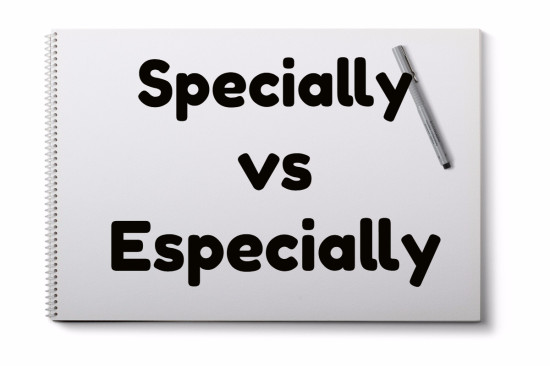Specially vs Especially: What Is the Difference?

What do these words have in common?
Both of them are adverbs (words that are used to describe a verb). Both of them can mean a thing was done for a particular purpose. For example, “I got this (e)specially for you!”
In this context, those who say either word means the same thing are spot on. However, I would venture to say “specially” would be the more common form in this context.
How do they differ?
The Cambridge Dictionary defines “especially” as meaning “particularly or “above all.” Let’s watch it in action:
- “She adores flowers, especially roses.”
- “He hates work, especially hard physical labor.”
If you were to replace “especially” with “specially” here, you would have sentences that people can understand, but your word choice would be considered colloquial at best.
Now let’s try the same exercise with “specially.” This word refers to a specific purpose for which something was done, and yes, it’s just like our very first example, where we demonstrated that “especially” and “specially” are interchangeable in certain contexts. Now you can play fast and loose and switch these two words around as you please. But remember, when the word you are looking for means “particularly” or “above all” ONLY “especially” will do.
- “The furniture was (e)specially designed for my living room.”
- “He bought the reddest rose (e)specially for her.”
Knowing which to use
Think of the word “particularly.” If you can replace the “special/especial” with “particularly,” then only “especially” is absolutely correct. Let’s look at one of our earlier examples:
- “She loves flowers, especially roses.”
- “She loves flowers, particularly roses.”
Does it work? Yes, it does! So “especially” is the right choice, while “specially” would be incorrect.
You’ll notice that trying to jam “particularly” into a “for a special purpose” meaning doesn’t sit quite as comfortably.
- “He bought the reddest rose particularly for her.”
Does it work? Not particularly! Now we know we can use whichever of the two words we prefer. Don’t you love freedom? If you’re in doubt, stick with “especially” since it works in both contexts. You can’t go wrong!
How important is it?
- “Not specially.”
- “Not especially.”
Which of these is right: the first one, or the second one? If you guessed that the second version is correct, you really do know the difference between these two words already. Congratulations!
Can you be sure?
“Not particularly,” works well in this context, so you can be sure that you are 100% correct.
But returning to our question “How important is it?” what do you think the answer is? I’d say that if you’re using language simply to be understood, it isn’t especially important because people would probably understand you even if you used “specially” in the wrong place. However, in written English, we have to be especially (particularly) careful about word choices, and picking the wrong one would make your teacher, or an especially (particularly) well-informed reader, upset at the wording.


Is specially even a word? I always thought it was a misspelling of especially. It just seems better to use especially when given the choice.
I had the same question & found this from the Cambridge online dictionary:
specially
adverb [ not gradable ] US /ˈspeʃ·ə·li/
in a particular way or for a particular purpose: “Her wheelchair was specially designed for her.”
So yes, it is a word and it has a distinct meaning. I don’t think we can substitute “especially” here, in the above example.
It seems that the easiest thing to do in this situation is just used “particularly” instead of specially or especially.
Or you could learn to properly use both words. Sometimes it’s worthwhile learning the difference between two words like specially and especially instead of opting for the easy way out.
It would seem that specially means only
Especially—is that even a word? I’ve always assumed that was a typo for particularly. Simply put, using appears preferable, especially when given the option.